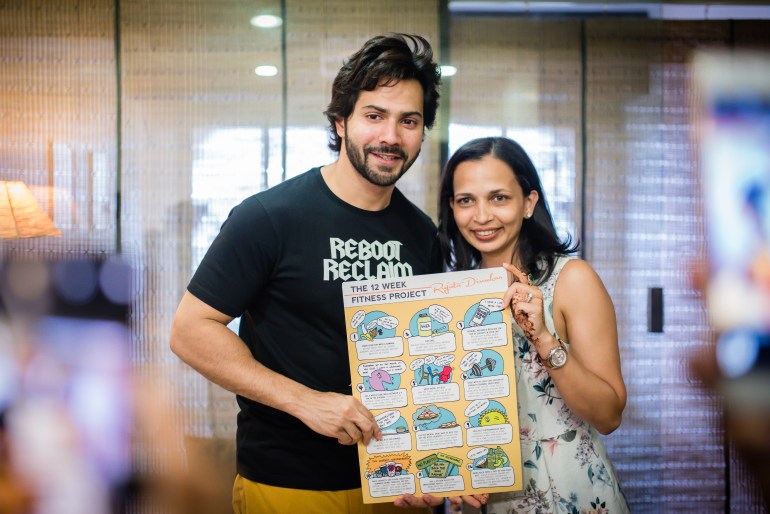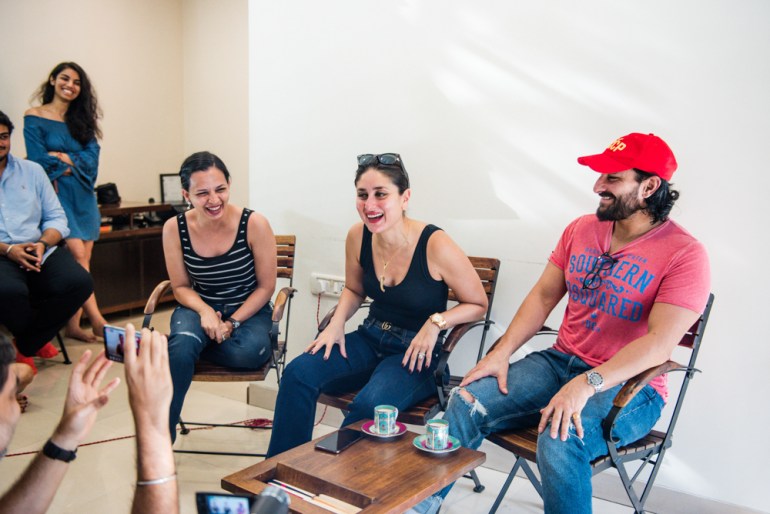India’s weight-loss guru Rujuta Diwekar on why grandma knows best
Rujuta Diwekar is considered India’s weight-loss guru, with a client roster that boasts Indian tycoons like Anil Ambani and Bollywood stars like Kareena Kapoor Khan.

“Rujuta Diwekar doesn’t measure her weight and height,” I was informed over email by her office, which signed off as “Team Rujuta”.
From someone who is considered India’s weight-loss guru and whose name still conjures up the image of Bollywood star Kareena Kapoor Khan’s body transformation to a skin-and-bones “size zero” for the sake of a bikini scene in a 2008 Bollywood movie, that would be an odd response.
Keep reading
list of 4 itemsHealthy Eating: What to do about meat and dairy?
French company convicted of manslaughter over deadly diet pill
Could changing our diets save the planet?
But Mumbai-based Diwekar, whose clients are spread across 50 countries and include some of India’s top Bollywood stars and business tycoons, has always gone against the grain.
India has about 13,000 registered dieticians – along with many more nutritionists and self-styled life coaches fighting for a slice of the country’s $502.7m weight-loss diet and management pie, according to London-based Triton Market Research.
Diwekar, 43, has managed to carve herself a high profile in this crowded space by dishing out advice that is at once discordant and unique, traditional but appealing.
In the age of intermittent fasting, keto diets, morning detox juices and CEOs surviving on one meal a day, Diwekar holds up Indian grandmothers as the ideal to be imitated. Food, she says, is not meant to be eaten out of packets. Instead, she says, eat like your grandmother used to – all things that are natural, seasonal and local.
“There is nothing we need to stay fit, healthy and lose weight that is not available in our kitchen or the local grocery store,” Diwekar tells Al Jazeera over a video chat from her living room in Mumbai. She is dressed casually, in a pink T-shirt, and has allotted 30 minutes for the conversation that eventually runs beyond an hour.

According to India’s National Family Health Survey, India is getting fat very fast. The World Obesity Federation says 30 percent of Indians are likely to be obese by 2040.
This obesity epidemic is fuelling health concerns, but it is also feeding a wellness industry worth $24bn – of which the “health food market” alone is expected to reach nearly $9.35bn by next year, according to a report by Ernst & Young and the Federation of Indian Chambers of Commerce and Industry.
Diwekar is peeved that the two people – grandmothers and farmers, who she thinks should be telling us what to eat and when to break this yo-yo cycle of Indians spending money on eating only to spend more shedding pounds – are never consulted by the industry, policymakers or dieters.
“Our traditional, collective food wisdom is priceless, but our outlook towards Indigenous foods and customs is skewed because of social media and the influence of big marketing budgets of the food industry,” Diwekar says.
She is trying to fix that, one diet plan at a time.

‘Most-followed nutritionist’
Mumbai, India’s business and glamour capital, is home to 16,933 millionaires and 60 billionaires, according to the 2021 Hurun Report, as well as the top echelons of India’s $2.44bn film industry. Many of them are Diwekar’s clients. She does not name-drop – for privacy reasons, perhaps, but also because it would distract from the “Rujuta Diwekar” brand.
Working with an all-women team of five out of a small office in a Mumbai suburb, Diwekar is one of India’s most sought-after dieticians, with a formidable influence online. “Among the world’s most-followed nutritionists” (this is how Diwekar refers to herself in most of her branding), she has an online coterie that adds up to 3.6 million followers across Instagram, Facebook, Twitter and YouTube.
She is also a best-selling, prolific author of nine books that have sold 1.5 million copies in India.
“What makes Rujuta stand apart is her truly unique perspective and excellent communication skills,” says Chiki Sarkar, who, as editor-in-chief of Random House India in 2008, had outbid another publisher to bag Diwekar’s first book, Don’t Lose Your Mind, Lose Your Weight. Thirteen years later, it remains India’s top-selling book in the “fitness and diet” section, according to Nielsen BookScan India. The second best-selling diet book in the last 10 years is also Diwekar’s.
“Rujuta’s is a 100 percent Indian perspective. No other health writer communicates that perspective with clarity. What does she say? Return to an Indian eating system … This profound world view is integrated in everything she does,” Sarkar told Al Jazeera.

Diwekar, who calls herself a nutritionist (she is technically not qualified as a dietician), writes like she talks. Chummy, breezy, but focused and practical. She often uses Bollywood catchphrases, axioms and proverbs instead of science to make her point. “Crash dieting,” she writes, “is like a fling with a bad boy. Even when you are in it, you know it’s not going to work long term.”
Actor Anupam Kher, who sought Diwekar’s services a few years ago, says he liked her because she is unconventional and let him indulge his tastes. Under her guidance, he dropped 14kgs (30.8lb) and his health parameters improved. Now 66 years old, he says he is fitter than he was at 60 – and Diwekar’s rules have stayed with him. “You know,” he tells Al Jazeera, “she’s a psychologist … I mean, she’s a very good listener.”
What he means is that Diwekar understands where and why her clients’ relationship with food is broken and is able to fix that.
When Diwakar sends a diet chart, she is doing multiple things simultaneously. First, she tries to take the challenge out of weight loss. “Health”, she says, “cannot be something that is only available to people with exceptional willpower.”
Food is life, enjoy it, she says.
She fashions her diets based on the health needs and weight-loss targets of her clients, of course, but does not split food into proteins, fibre and carbs. Nor does she specify portions.
Her diets include traditional Indian dishes, and she caters to cravings. Eat mangoes, drink non-branded, regular milk from your local dairy, add ghee (clarified butter) to white rice and dal, drink sugar cane juice, add sugar to your chai, she says.
At the same time, she insists clients stick with her six simple rules, which include waking up closer to sunrise, eating fruit or nuts within 10 minutes of waking up, having a home-cooked breakfast, and instead of three large meals, breaking them down and eating every two hours.
By allowing people comfort foods according to the eating tradition and region they are from, she brings the grandmother and farmer back to the dinner table and directly challenges the health food industry’s latest fad diets and “exotic” foods sold with the suitable-for-all spiel.
But Diwekar’s folksy advice is not cheap.
For a 12-month programme where she meets a client for half an hour, twice a month, she charges $20,000. That’s $1,666 an hour and there’s a two-month wait to get in.

Kher says that he found the money he spent consulting Diwekar “worth it … because I could afford it”. That apart, he also liked “the arrogance of it”, because she is “someone who came from scratch and has made it on their own”, he says.
A smile and a namaste
Born in an upper-caste Maharashtrian family to a chemistry professor mother, Diwekar is a graduate in industrial chemistry and holds a diploma in sports science and nutrition. She practises and studies yoga and is an avid trekker – and for both, she keeps returning to the Himalayas, where she has found love at least twice: once in 2005, when she met a tall German with dreadlocks at a yoga institute, and the next year, when she met her future husband on a trekking trip.
It was a little before that, in 2004, that Diwekar first came into the limelight. She was training Anil Ambani – the younger sibling of India’s richest man, Mukesh Ambani – to run the Tata Mumbai Marathon. Ambani shed one-third of his weight, ran the marathon and the brand “Rujuta Diwekar” was born.
Apart from the paying clients, Diwekar has also built an impressive following online by offering weight-loss tips and programmes for free.

In January 2018, Diwekar experimented with a free 12-week weight-loss programme online. Within five hours, 75,000 people signed up from across 40 countries. She now regularly posts food and exercise videos, dieting tips and snapshots of personal moments for her fans.
All of Diwekar’s videos begin in the same animated, inviting way – a warm smile, a namaste and a shake of the head. Her hair is often pulled up into a ponytail and she is dressed casually, in a T-shirt over shorts or stretch pants. On her petite frame three things stand out: the large white dial of her wristwatch, her big aviator spectacles and a prominent forehead. She speaks quickly and gestures vigorously. Some mornings she is doing a headstand. Some days it is chalk talk about the virtues of Indian pickles, mangoes or sugar. Other days she is in the kitchen, cooking.
All her posts and videos swirl around the same message: “Our traditional food wisdom is priceless because it has been lived, tried and tested over centuries, and it trumps what industry-backed science is telling us”.
But not everyone buys into that message.
Shonali Sabherwal is a Mumbai-based vegan, macrobiotic chef and nutritionist who ran a meal service for nine years catering to Bollywood stars, including Katrina Kaif and Jacqueline Fernandez. She recalls the uproar over Diwekar’s suggestion to have sugar that was included in her book, Indian Superfoods, in a chapter titled, Sugar: The Anti-Ageing Secret.
“She says, have a little bit. What is a little bit? There is a chemistry of gut health, and sugar destroys gut bacteria. Sugar can be poison … [but] when you get that big, you can sell s*** on a sandwich and it will sell,” Sabherwal told Al Jazeera.
Diwekar dismisses all criticism, offering obscure research papers, obfuscation and idioms to fit the story she wants to tell. “The day people stop criticising you, you are no longer relevant, or you are dead,” she says.
Clearly, she is relevant because in the last few years there has been a burgeoning of Rujuta Diwekar-esque dieticians across India who offer similar advice at a cheaper price. But none is as popular as Diwekar.
One reason for that is Diwekar’s regular, public declarations that she does not and will not endorse any product or brand. She gets many such pitches. In the COVID-19 pandemic months alone, she received more than 700 brand endorsement requests for products claiming to be immunity boosters.
“Every crisis is an opportunity for someone. The corporate food industry is now appropriating our culture, our foods, repackaging and selling it to us … Never before has fear been monetised the way it has been done in the last one year,” Diwekar says, recalling there were makers of oils, biscuits, cereals, even lipsticks willing to pay for social media posts.
The COVID-19 crisis has instigated an anxious shift towards healthy, natural, organic products and India’s top packaged food companies have caught on to that. Some, like Hindustan Unilever Ltd and Dabur India, are planning a new range of health supplements, while others have reportedly pledged to improve the nutritional content of their existing products.
Diwekar says she is ambitious, but not in the way corporates would like her to be. She is not interested in taking her company – a sole proprietorship named after her – public. She wants to keep her brand, “Rujuta Diwekar”, simple, small and personal.
“Food is a very, very intimate thing … you are building a relationship for a lifetime,” she says. “I’m very ambitious. I want my clients’ grandchildren to inherit the diets they are on.”